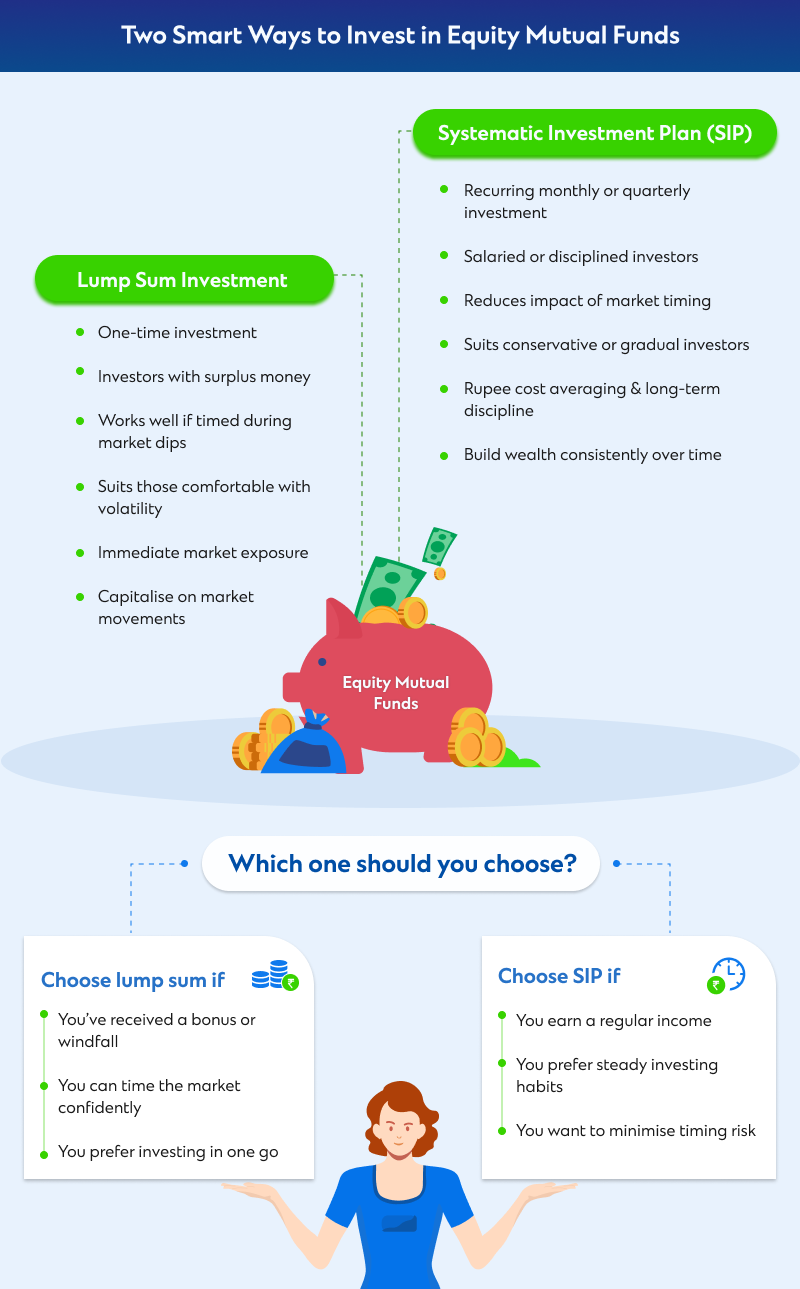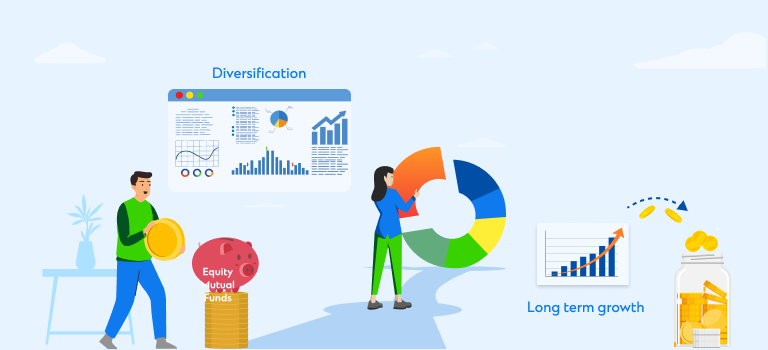

Table of Contents
- What are equity mutual funds and why it matters for long-term investments?
- Types of mutual funds: where equity funds fit in
- What is an equity fund? Key features of equity mutual funds
- What are ways to invest in equity mutual funds?
- What factors should I consider before starting equity investment?
- Conclusion: Navigating equity mutual funds for smart investing
Let’s be honest: investing can feel a bit intimidating at first. With so many choices out there, it’s easy to feel lost. But if you’re aiming for steady long-term growth — and can handle a little market drama along the way — equity mutual funds might just be your new best friend.
Whether you’re saving for retirement, a child’s education, or just looking to grow your wealth steadily, understanding how equity mutual funds work can set you on the right path. Let’s dive in.
What are equity mutual funds and why it matters for long-term investments?
Equity mutual funds collect money from many investors and invest most of it (at least 65%, as per SEBI rules) in stocks or equity-linked instruments. These funds aim to help your money grow over the long term by investing in shares of various companies.
Equity mutual funds are great if you’re aiming for higher returns and are willing to take on some risk, and are comfortable with some market ups and downs. They’re particularly helpful for long-term goals like retirement, children’s education, or wealth creation.
Here’s why they work so well over time:
- Market participation: Equity funds invest in stocks, allowing you to benefit from the overall economic and corporate growth over time. Staying invested means you participate in the growth journeys of companies across different sectors.
- Handling volatility: While equities can be volatile in the short term, market fluctuations tend to smooth out over longer periods. Historically, long-term equity investors have been rewarded with higher returns compared to short-term traders.
- Aligned with big financial goals: If you’re saving for goals like retirement, children’s education, or building a significant corpus, equity mutual funds can help you outpace inflation and grow your wealth meaningfully.
Types of mutual funds: where equity funds fit in
Mutual funds come in different types based on what they invest in. Let’s quickly understand them:
- Equity mutual funds: These invest mainly in stocks and are suited for investors who want growth.
- Large-Cap Funds: Invest in big, stable companies.
- Mid-Cap Funds: Choose medium-sized firms with strong growth potential.
- Small-Cap Funds: Target smaller companies with higher growth opportunities but more volatility.
- Sectoral/Thematic Funds: Invest in specific sectors like healthcare, technology, or certain themes like ESG (environment, social, governance).
- ELSS (Equity Linked Savings Scheme): Offers tax benefits under Section 80C, with a lock-in period of 3 years.
- Debt mutual funds: These funds invest in safer assets like government and corporate bonds. They’re suitable if you prefer regular income with less risk.
- Hybrid mutual funds: These blend equity and debt investments, aiming to strike a balance between risk and returns—ideal if you want moderate growth with stability.
For more details on mutual fund categories, visit Standard Chartered’s Fund Select platform.
What is an equity fund? Key features of equity mutual funds
An equity fund is a type of mutual fund that primarily invests in shares (also called equities) of different companies. The main goal of an equity fund is to help investors grow their money over the long term by participating in the stock market.
Here are some key features:
- Professional management: Expert fund managers pick stocks carefully after thorough research.
- Diversification: Your investment is spread across various sectors and companies to reduce risk.
- Liquidity: Easy to enter and exit whenever you want. Some funds may charge an exit load, which is a penalty that is levied for exits within a certain timeframe of the investment.
- Potential for higher returns: Stocks can deliver growth over the long term.
- Market-linked returns: Your returns depend on market performance and will fluctuate accordingly.
Remember, while equity funds can give higher returns, they come with a higher level of risk and are generally riskier than debt funds.

What are ways to invest in equity mutual funds?
You can invest in equity funds through two ways:
- Lump sum: Investing a certain amount in one go.
- Systematic Investment Plan (SIP): Investing a fixed amount regularly (monthly or quarterly).
Both lump sum and SIP are ways to invest in equity mutual funds — but they work differently and suit different financial situations. Here’s how they compare:
Lump sum investment
You invest a certain amount in one go. This is easier when you have surplus money ready (like a bonus, inheritance, or big savings).
Works well if you can time the market smartly — for example, during market corrections or dips.
Suitable for investors who are comfortable with market volatility and want to put money to work immediately.
Systematic Investment Plan (SIP)
You invest smaller, fixed amounts at regular intervals (monthly or quarterly). Ideal for salaried individuals or those who prefer disciplined, gradual investing.
Helps manage market ups and downs through rupee cost averaging.
Perfect for long-term wealth creation without worrying about market timing.
Why choose SIP?
SIP is great because of the following reasons:
- Rupee cost averaging: Regular investing helps average out market highs and lows.
- Disciplined investing: It encourages saving consistently.
- Power of compounding: Small regular investments can significantly multiply your wealth over time.
- Flexibility: You can start investing amounts as low as ₹100 per month.
Here’s how SIP investments could grow:
| Monthly SIP (₹) | Period (Years) | Total Invested (₹) | Annual Return (%) | Final Amount (₹) |
| 5,000 | 10 | 6,00,000 | 12 | 11,61,695 |
| 10,000 | 15 | 18,00,000 | 12 | 50,45,760 |
| 15,000 | 20 | 36,00,000 | 12 | 1,49,87,219 |
(The figures are illustrative only. Use the SIP calculator to calculate returns on your investments)
What factors should I consider before starting equity investment?
Before jumping into equity mutual funds, it’s smart to evaluate a few key factors.
Here’s a simple checklist to help you decide if you’re ready:
- Risk tolerance: Are you comfortable seeing your investment value fluctuate? Equity investments can go up and down in the short term, so it’s important to assess how much volatility you can handle without panicking.
- Risk tolerance: Are you comfortable seeing your investment value fluctuate? Equity investments can be volatile in the short term—and while long-term investing can improve your odds of earning better returns, it does not eliminate the risk of loss. Make sure you’re prepared for both short-term market volatility and the possibility of underperformance even over the long term.
- Investment horizon: Equity mutual funds work best if you plan to stay invested for at least 5 years or longer. The longer you stay invested, the more time your money gets to recover from market dips and growth.
- Financial goals: Define why you are investing. Are you saving for retirement, a house, children’s education, or just general wealth creation? Clear goals help you pick the right type of equity fund.
- Knowledge and research: While you don’t need to be a stock market expert, having a basic understanding of how markets work can help you stay calm during market movements and make smarter decisions.
- Current financial health: Make sure your basics are covered — like having an emergency fund and no high-interest debt — before you start investing in equities.
- Willingness to stay invested: Equity investing rewards patience. You need to be mentally ready to ride out market volatility and avoid reacting emotionally to short-term market news.
Conclusion: Navigating equity mutual funds for smart investing
Equity mutual funds can be a powerful tool for growing your wealth, provided you’re comfortable with some market risk. By understanding different fund types and choosing investments aligned with your financial goals, you set yourself up for long-term success. Starting early with SIPs lets you benefit from compounding, significantly enhancing your potential returns.
Standard Chartered Bank offers a variety of mutual fund investment options tailored to different investor profiles. With user-friendly tools and expert guidance, getting started with your investment journey is easier than ever.
Ready to start investing? Explore Standard Chartered Bank’s SIP plans and take your first step towards building wealth today!



